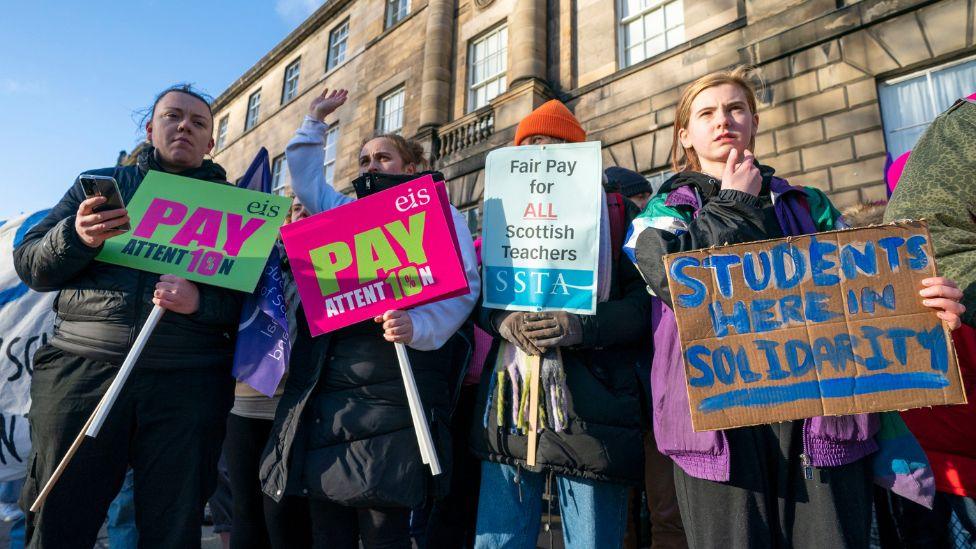Scottish teachers announce 22 more days of strikes
- Published

Scotland's biggest teaching union has announced 22 additional days of strikes amid a pay dispute.
The Educational Institute of Scotland (EIS) confirmed the dates, which come in addition to a 16-day programme of rolling industrial action set to begin next week.
It follows talks between unions, councils and the Scottish government on Thursday.
Ministers and councils have said a requested 10% pay rise is unaffordable.
Teaching unions have so far rejected a 5% pay increase, including rises of up to 6.85% for the lowest-paid staff.
The education secretary urged teaching unions to reconsider their plans for industrial action.
EIS members have already taken three days of national strike action - one in November and two in January.
The programme of additional strike action will include two days of national strike action in all schools on 28 February and 1 March, followed by a rolling programme of strikes for 20 days between 13 March and 21 April.
Over the rolling strike period, each local authority area will be impacted by three consecutive days of action, with one day of strike action in all schools bookended by one-day strikes in primary and secondary schools.

Following a meeting of the EIS executive committee, general secretary Andrea Bradley said: "The recent days of strike action by Scotland's teachers have succeeded in bringing Cosla and the Scottish government back to the negotiating table - but they have yet to put a single extra penny onto that table.
"Scotland's teachers rejected a sub-inflationary 5% offer six months ago, and little or no progress has been made in negotiations since.
"Our members are resolute and determined to secure a fair pay settlement, which both properly reflects their value and also takes account of the soaring cost of living."
Any new deal would need to be agreed by all 32 council leaders. They are currently not due to meet for two weeks.
Education Secretary Shirley-Anne Somerville said: "Strikes in our schools are in no one's interest - including for pupils, parents and carers who have already had to deal with significant disruption over the past three years.
"It is disappointing that the EIS has proceeded to escalate industrial action - we are continuing to urge teaching unions to reconsider their plans while talks are ongoing."
She said recent discussions had been constructive.
Earlier this week all four unions representing teachers and headteachers walked out together for the first time.
It involved members of the EIS, Scotland's largest teaching union, the NASUWT, Scottish Secondary Teachers' Association (SSTA) and the Association of Headteachers and Deputes (AHDS) unions.


The EIS is giving plenty of notice of the next round of action. The new round of strikes will be nearly a month after the rolling round of regional strikes which begins on Monday comes to an end.
The action announced represents an escalation - two consecutive days of disruption in all parts of Scotland rather than one. The next round of regional strikes, due mid March, would affect schools as senior students prepare for exams.
The union hopes that by giving so much notice, it will provide plenty of time for councils and the Scottish government to make a pay offer acceptable to its members.
But it had always hoped the very threat of strikes would be enough and that action would not be necessary.